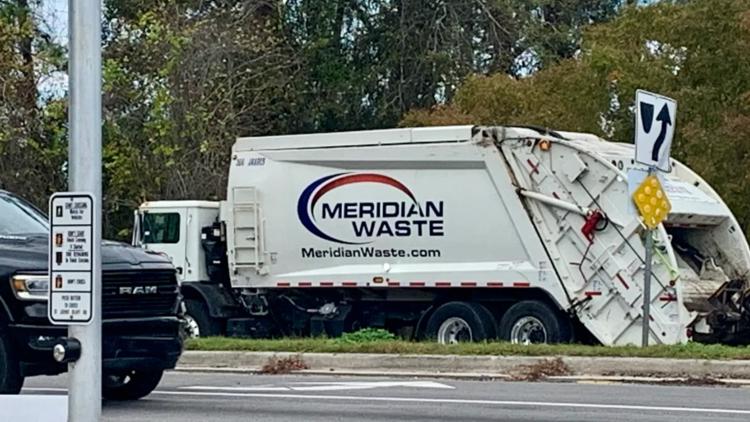JACKSONVILLE, Fla. — The days of missed garbage pickups that enraged Jacksonville residents have ended, but the cost of fixing that mess is putting the city's solid waste fund on track to be about $500 million in debt by 2031 and is drawing comparisons by one City Council member to the city's pension fund debacle.
The city assesses a garbage fee for residential curbside collection that once raised enough money to cover the cost of pickup and disposal. But the city's cost of carrying out that service has spiked in recent years while the garbage fee hasn't changed since 2010.
The gap widened after City Council voted Tuesday in favor of a 29% increase in what the city pays Meridian Waste, one of two commercial haulers contracted by the city. Council members said they don't want to see a repeat of what happened three years ago when yard debris went uncollected for weeks at a time and the city had to suspend curbside recycling to catch up.
Mayor Donna Deegan supported a smaller 5% increase recommended by a rate review committee for Meridian. The 17-2 vote by City Council marked the second year in a row City Council rejected a recommendation from the city's own rate review committee and approved higher payments sought by a commercial hauler.
"The additional increase passed by the City Council tonight is unnecessary, beyond what was allowable in the existing contract and coming out of operating reserves when important city priorities were previously not funded," Deegan's office said in a statement.
City Council slashed initiatives in the summer from Deegan's proposed budget that would have made one-time expenditures from operating reserves for affordable housing and homelessness prevention programs.
Council member Matt Carlucci floats more than doubling garbage fee
The shortfall in covering expenses from the garbage fee has forced the city to take money from its general fund to make up the difference. Interlocal agreements between the city of Jacksonville and the Beaches cities require the city to classify the money coming from the general fund as loans that the city must repay to its general fund.
City Council member Matt Carlucci, who wants to raise the fee assessed on residents for curbside pickup, said the city's handling of the solid waste fund is shaping up as a repeat of how the city handled the pension obligations.
Jacksonville piled up unfunded pension obligations that eventually forced huge annual payments by taxpayers that choked off spending on city services until voters approved a half-cent sales tax for paying down pension debt.
"This is something that's beginning to look pension-esque to me," Carlucci said during a public meeting he convened Monday about the garbage fee. "How many of you remember the pension plan and how that was compounding every year? Well, that's happening here."
Carlucci made the comparison when he circulated a draft ordinance that would more than double the garbage fee to $364.80 per year from its current amount of $151.80. Carlucci said he's open to discussing a phased-in increase in the fee. He also plans to file legislation that would give discounted rates to low-income residents in the same way the city gives that protection for the stormwater fee.
"If we want to fix this, what I'm proposing will do it," Carlucci said.
City Council decides to pay Meridian Waste more than rate review recommends
The loan amount to the solid waste fund is getting bigger each year, resulting in the total debt growing as well. The loan balance this fiscal year will be $97 million and that will grow to $146 million the following year. Future loans will cause the total loans to reach $505 million by the 2031-32 budget year, according to an analysis by the City Council Auditor's Office.
While City Council has left the residential garbage fee unchanged, council has twice gone beyond what a rate review committee comprised of city staff recommended for how much the city should pay commercial haulers.
In 2023, the rate review committee determined the city's payment to Waste Pro of $14.66 per month per premise should increase to $19.01 per premise. City Council decided to set the rate at $23.11 per premise. Inflation-adjusted increases since then have brought Waste Pro's rate to $24.91.
This year, the rate review committee recommended taking the $17.42 per premise payment to Meridian Waste up to $18.29 per premise. City Council members decided that wasn't enough after hearing from Meridian Waste. They voted Tuesday to raise Meridian's rate to $22.39 per premise.
Going to that higher rate will add another $4 million in expenses for the city. City Council will draw from the city's operating reserves to cover the cost.
Representatives of Deegan and the Public Works Department told council they didn't support going beyond an increase to $18.29 per premise. They say their rate review was based on following the terms of the contract that Meridian signed with the city.
Solid Waste Division Chief Will Williams said Meridian has done a "great job" but city staff put a lot of time into doing the rate review for the recommendation it made to City Council.
"It's about the people and it's about the people's money," Williams told a City Council committee. "Now we're just going to give away money. It's your choice."
Council members supporting the higher rate agreed with Meridian the company would have a harder time maintaining its current level of service if there is a large gap between its payment rate and what City Council approved for Waste Pro in 2023.
"I like to be proactive instead of reactive," City Council President Randy White said during a City Council committee meeting.
He said there are "zero problems" now with Meridian's service but if it does not have payment rates closer to Waste Pro so it can pay competitive wages, "we will start having problems."
Memories of garbage woes still raw for council members
City Council members Ron Salem and Michael Boylan recalled the upheaval in garbage collection in 2021 and 2022 when the city suspended curbside recycling pickup for half a year because the companies contracted by the city could not pay wages that would attract people to fill garbage truck driver vacancies.
"This is a critical service for the rank and file of our constituents out there," Boylan said. "They understand, appreciate and judge us on taking care of their immediate needs, and this is very high — like it or not — as a priority for our constituents."
Salem said after Meridian took over from Republic in 2021 for picking up garbage in the part of town that includes Arlington, service quickly went from being "a disaster" to becoming excellent.
That turnaround came at a higher cost for the city. The city was paying Republic at a rate of $12.94 per premise, significantly less than what Meridian is getting.
Carlucci voted against going above what the rate review by the Public Works Department recommended for Meridian. He said the $4 million in additional expense will necessitate more money being borrowed by the solid waste fund and he objected to using operating reserves to pay for a recurring expense.
"I don't pay my electric bill with my savings account," Carlucci said.
Salem said the city has three core services — police, fire and picking up garbage — that justify using the operating reserves. He said in this case, he disagrees with the City Council Auditor's assessment on what the city's payments to Meridian should be.
"I've met with Meridian and I was concerned they could survive at that rate, frankly," Salem said.
This story was first published by The Florida-Times Union.



